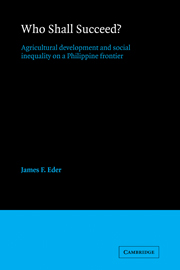Book contents
- Frontmatter
- Contents
- List of tables, figures, and maps
- Preface
- 1 Introduction
- 2 Rich man, poor man: life in a frontier farming community
- 3 The economic and social origins of the migrant farmers
- 4 Eight migrants
- 5 The origins of social inequality
- 6 The maintenance of social inequality: earning a living
- 7 The maintenance of social inequality: earning prestige
- 8 The perpetuation of social inequality?
- 9 Conclusion
- Appendixes
- Notes
- Bibliography
- Index
7 - The maintenance of social inequality: earning prestige
Published online by Cambridge University Press: 23 May 2010
- Frontmatter
- Contents
- List of tables, figures, and maps
- Preface
- 1 Introduction
- 2 Rich man, poor man: life in a frontier farming community
- 3 The economic and social origins of the migrant farmers
- 4 Eight migrants
- 5 The origins of social inequality
- 6 The maintenance of social inequality: earning a living
- 7 The maintenance of social inequality: earning prestige
- 8 The perpetuation of social inequality?
- 9 Conclusion
- Appendixes
- Notes
- Bibliography
- Index
Summary
San Jose residents may today work longer hours than their forebears ever did in Cuyo, but the other things in life still loom large for them. Even the peripatetic Andres Rabang eventually puts his work aside each day to live for the present, to relax over some coconut wine with his wife and older children. Other men and women, lured by the excitement of election-time politics, or the challenge and responsibility of elective office in a voluntary association, or the simpler pleasures of a friendly game of dominos, also find emotional fulfillment in the everyday interactions of community social and political life. But no longer do kinship and geographical propinquity alone regulate, as they did in a more egalitarian Cuyo, such interaction. In a stratified social order, social status itself intrudes on patterns of interest and association and, ultimately, on how the valued “other things in life” are perceived and sought. These “other things in life,” variously called affective satisfactions, psychic gratifications, peer approval, or self-regard, I will call “personal prestige.” How a person chooses to earn personal prestige, no less than how he chooses to earn his living, reflects his social status. Yet while all persons find ways to earn prestige, the ways that poor people earn prestige tend to maintain their low status evaluation in the eyes of the community.
This chapter, then, is about the search for personal prestige, and about how this search is influenced powerfully by economic and social context.
- Type
- Chapter
- Information
- Who Shall Succeed?Agricultural Development and Social Inequality on a Philippine Frontier, pp. 129 - 152Publisher: Cambridge University PressPrint publication year: 1982

